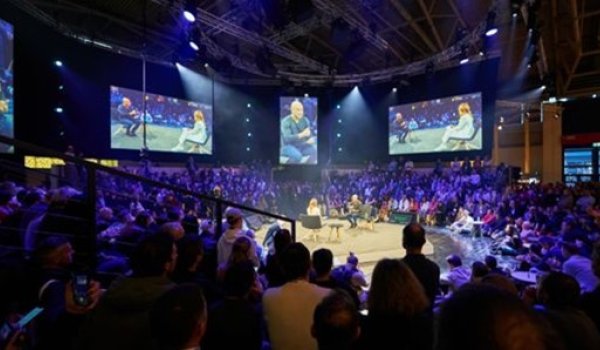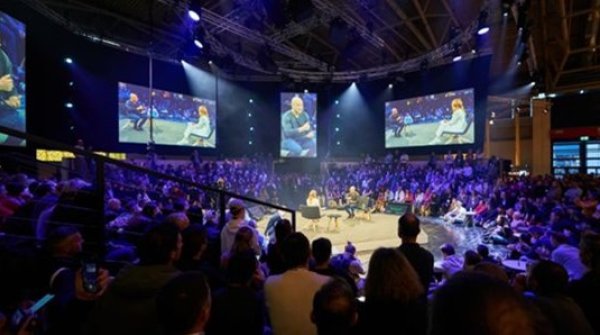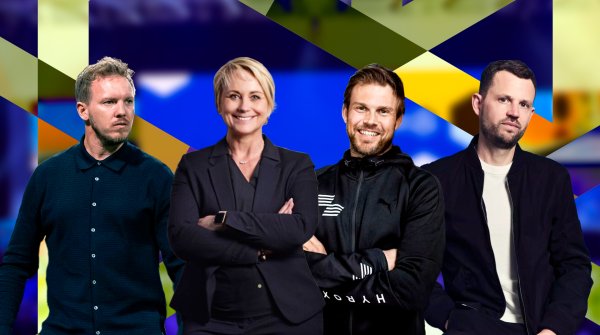- Malaika Mihambo: Power, passion and progress in sport
- Alexander and Mischa Zverev on the future of sport, mixed reality technology and IMPROVR's brain-based training
- ISPO Brandnew: Founders Fights - Pitches, Speed-Dating & Award Ceremony
- ISPO Textrends Fall/Winter 26/27 Trend presentation and award ceremony
- Building the Future with Patagonia: Responsibility and partnership in the supply chain
- Playing to Learn: How sport builds bridges and changes society
- Innovative design approaches for a sustainable and future-proof sports industry
- Digital wholesale: how technology is changing the world of sports and fashion
- Beyond Compliance - sustainability & transparency made easy
- Shaping the future: New EU regulations in the sports industry
- Running in transition: market strategies and health trends
- Sports Tech Nation - Innovations, technologies, visions
- German Trainers' Summit 2024: Meeting place for knowledge, exchange and new perspectives

She is the German track and field athlete par excellence of recent years - with multiple victories in the long jump at the World and European Championships and a gold and silver medal at the Olympic Games, Malaika Mihambo has delighted her fans. And with her balanced manner as well as her insights, the ISPO Munich audience. About tears and the emotions behind her silver medal in Paris, her commitment, but also how important the other parts are to her that make up her person besides her sport, from her creative side or herself as a private person. She also gave insights into the work of her Malaikas Herzsprung e.V. Foundation, which gives children access to sport.
She also summed up what has brought her to where she is today as an athlete: "Really believing in myself! Because so many other people can believe in you and see you, if it's not you, any doubt or fear in competition makes you weak. I'm still excited about how I can continue to push my own limits, both physically and mentally, to become the best version of myself."
In the session "Train intelligently" Alexander and Mischa Zverev gave insights into the future of training, supported by mixed reality and the VR-supported neuroathletics platform Improver. Alexander Zverev, currently number two in the world rankings, explained digitally: "With IMPROVR, I can control my body better and specifically compensate for weaknesses - that makes the difference between success and injury." The innovative technology uses data and visual exercises to activate the nervous system and optimize movements.
Mischa Zverev emphasized that IMPROVR is not only suitable for professional athletes: "Whether children or adults - the early use of such tools can create sustainable improvements." The brothers emphasized that technologies such as VR and AI can revolutionize training and help athletes to exploit even the smallest performance reserves. "It's often the last one to two percent that make the difference between fifth and first place," said Alexander Zverev.

The ISPO Brandnew Founders Fights continued its series of inspiring startup pitches with two more categories: Performance, Body & Mind and Sports Technology & Platforms . Eight promising companies presented innovative approaches ranging from smart clothing to AI-supported fitness solutions.
In the category Performance, Body & Mind category Nutrion from Alivion impressed with an AI-supported system for creating personalized nutrition plans and was named the category winner. In the Sports Technology & Platforms was won by BreezeLabs came out on top. Their headphones with an integrated microphone that tracks breathing rate and provides real-time feedback for athletes impressed both the jury and the audience alike. In the Sustainability category Cirql Zero. The start-up impressed with its innovative compostable midsole, which could drastically reduce the amount of waste in the footwear industry.
But the grand finale brought together all the winners from the previous categories: Vitaloop FlexGuard Water Filtration Bottle from the outdoor category and Cirql Zero from the sustainability category battled it out against today's winners for the crown. In the end, Vitaloop triumphed as the overall winner - an innovative solution that puts the focus on clean drinking water worldwide and puts sustainability at the center. A worthy conclusion to a series of impressive pitches.

The ISPO Textrends Awards at ISPO Munich 2024 presented the most innovative textiles, fibers and designs for the coming season. With over 350 entries, the event highlighted how creativity and sustainability are shaping the future of the industry. "We need to move forward together - in terms of sustainability, performance and collaboration," explained Louisa Smith, the central personality behind the textile trends.
The mega trends of the season - Clarity, Unlock and Primal - reflect the most important developments. Clarity emphasizes the circular economy and renewable energy in production, while Unlock emphasizes digitalization and automation as key factors for efficiency. Primal focuses on the human connection and emotional values that cannot be replaced by AI.
Among the winners in the various categories, Südwolle impressed with an innovative base layer that combines natural and synthetic fibers. INRESST scored with recycled polyamide made from ocean plastic and Fujian Suntion Textile Technology set new standards with ultra-light and durable outer layer materials.
The exhibition in Hall A3 offered the opportunity to experience the award-winning textiles up close and discover the developments in the industry - an inspiring highlight of ISPO Munich 2024.

"Building the Future with Patagonia: New Supply Chains & the Shift to the Better and Bigger", this presentation was about sustainable strategies in the supply chain and how they can be implemented through innovation and collaboration. Matt Dwyer, VP of Global Product Footprint at Patagonia, emphasized the challenges that pioneers like Patagonia are facing: "The first steps were always voluntary - from organic cotton to recycled materials. But now legislation is catching up."
Dwyer used specific examples to illustrate how Patagonia is tackling complex issues: from not using PFAS, to 90% recycled nylon feedstocks, to partnerships that make the entire supply chain transparent and fair. "Sustainability means embracing complexity and solving problems, not avoiding them." However, real change can only be achieved through collaboration: "Our goal is not to be successful alone, but to pull others along with us."
Laureus CEO Ned Wills opened the session "Playing to Learn - The Laureus Sport for Good Foundation & the Universal Language of Sport" with a clear message: "Sport is a universal language that can overcome barriers and change societies." He was accompanied by soccer players Kosovare Asllani and Georgia Stanway, who shared their personal experiences of how sport positively impacts the lives of young people around the world.
Kosovare Asllani talked about her project in Sweden, in which girls from different social backgrounds are integrated through soccer. "We not only had to convince the girls, but also their parents - and in the end, they were our biggest supporters." Targeted investment and long-term commitment should not be underestimated: "If we give the girls the right resources, we can achieve great things."
Georgia Stanway shared her vision of creating safe spaces for children through sport: "My goal is to create a place where children can express themselves freely - regardless of where they come from." Both athletes emphasized the responsibility to encourage the next generation through role models and investment.

"Love everyone": Get the limited charity shirt by Lina Magull and support sports projects for children and young people in Germany and Austria - available at ISPO Munich or online!

In the session "How Can Design Processes in the Automotive Industry Inspire & Accelerate Change in the Sports Industry" experts from Polestar, Renault and Dacia showed how automotive design methods can inspire the sports industry. François Farion from Renault explained: "Sustainability needs innovation - recycled materials such as old bumpers or PET bottles are an important step." Komal Singh from Polestar emphasized: "Inspiration from fashion and sport shows where society and culture are heading."
Examples such as 3D knitting technology or unpainted recycled plastic surfaces show how interdisciplinary collaboration drives innovation and sustainability. Thinking outside the box that can accelerate change.
The session "Repair, Renew, Remake" showed how design drives sustainability and inclusivity. Femke Vesters from Berghaus presented the ADAPT collection, which responds to the needs of a wide range of users with customizable features such as extended zippers and improved ventilation. "We want to make outdoor equipment accessible to everyone," emphasized Vesters.
Paul Kerssens from the United Repair Center explained why repair is the key to the circular economy: "Repair is the new cool." The center relies on an accessible repair network and qualifies people with difficult access to the job market.
The session "The Future of Sport & Fashion: How Digital Wholesale Drives Brand Success" showed how digital platforms such as Joor are revolutionizing wholesale. Alan Cunningham from Joor explained: "Our platform reduces the effort required for manual processes and optimizes the ordering process - with time savings of up to 40%." At the same time, it enables real-time data analysis, allowing brands to continuously monitor their performance and adapt their strategies.
Saskia Rettenbacher from ISPO emphasized the synergy between digital and physical formats: "The combination of trade shows and digital tools creates new opportunities to strengthen customer relationships and open up international markets." The session underlined that wholesale is no longer based solely on catalogs, but is becoming increasingly data-driven, efficient and flexible - an exciting development that will benefit brands and retailers alike.
In the presentation "Beyond Compliance - Best Practices for Achieving Transparency and Sustainability", Patagonia, Bluesign and Retraced discussed how transparency can become a strategic advantage. "We are at a turning point - from data collection for compliance to real management," explained Nick Allen from Patagonia. Barbara Oswald from Bluesign added: "Sharing data is about building trust - the key to true transparency." But how Philipp Mayer from Retraced emphasized: "Less than 20% of brands have insight into the second level of the supply chain." The discussion made it clear that without close collaboration and new technologies such as AI, transparency remains a challenge.
The presentation "The Impact of EU Due Diligence legislation on the European Sporting Goods Industry" highlighted the far-reaching effects of new EU legislation on supply chains in the sporting goods industry. Chiara Mingozzi from the Federation of the European Sporting Goods Industry (FESI) emphasized: "The biggest challenge is to ensure data and transparency along the entire supply chain."
The focus was particularly on the Corporate Sustainability Due Diligence Directive (CSDDD)which obliges companies to identify and remedy environmental and human rights violations along the supply chain, as well as the ban on products manufactured using forced labor. According to Mingozzi this requires enormous efforts: "Companies must prioritize risks and create mechanisms to report and remedy violations." The first large companies will be obliged to comply from 2027, while smaller companies will follow from 2028.
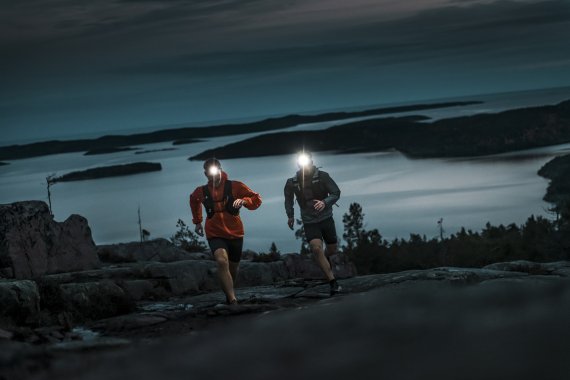
Running is more than just a trend - it is a movement that connects people worldwide and at the same time brings new challenges with it. At ISPO Munich 2024, various panels and discussions showed how the running boom is shaking up the sports industry.
In the panel "Rosy or rusty: How the running trade is celebrating success, who is benefiting - and who is not" the experts showed: Interest in running is growing all the time. The best example of this is the record numbers at events such as the Berlin Marathon, which recorded over 50,000 participants from all over the world. "Running is the most democratic of all sports," emphasized panelist Andreas Söfke, and the numbers prove him right: memberships in German sports clubs have reached an all-time high of 28.8 million.
But the boom also brings challenges. According to Dietmar Brandl from Circana Research, the market for running shoes is growing, but this is mainly due to higher prices - not rising sales figures. In addition, smaller running events are coming under increasing pressure as organization and financing become more and more difficult. Nevertheless, the enthusiasm for running remains high: "It is a sport that connects people regardless of age and origin," said the panel of experts.
In the session "Health and Longevity as a Trend" the health benefits of running were also highlighted. Regular exercise can reduce the risk of premature mortality by up to 40% - even a few minutes a day have a measurable effect. Luise Walther emphasized: "The brain is the boss of exercise. A holistic approach is crucial for activating people in the long term."
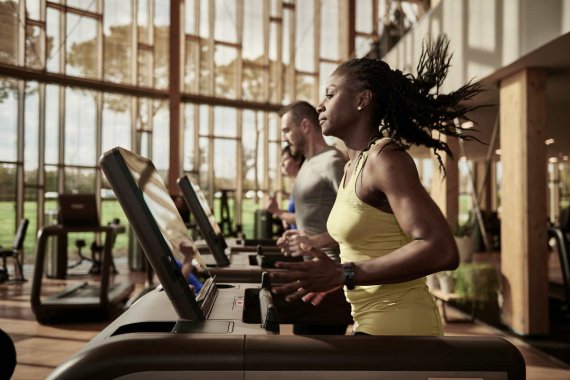
Sports Tech Nation, a partner conference of ISPO Munich, brought together leading experts, start-ups and brands from the world of sports and technology. Oren Simanian, founder of Sports Tech Nation, emphasized the relevance of the event: "Sports is late to the game when it comes to technology - but now is the moment for sports to boom through innovation."
The conference showed how data-driven technologies, digital transformation and innovation can make the difference between a gold and a silver medal. "Sport is live, unpredictable - and that's why it's more valuable than ever," said Simanian. The event offered a variety of highlights, including exciting insights into the technology behind Alexander Zverev's serve, strategies to promote technological progress in sport and the unveiling of new UEFA Champions League innovations.
"This is our Mecca - the place where start-ups, investors and sports managers shape the future of sport," explained Simanian. Sports Tech Nation was not just a meeting point, but a platform for the next generation of sports technology developments.
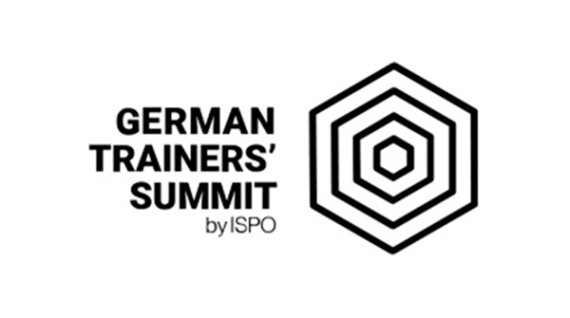
At the German Trainers' Summit 2024, one thing became clear: trainers play a crucial role in the success of sport. ISPO Munich's partner conference brought together experts from the fields of science, technology and coaching to discuss the future of training. Topics included new training approaches, the use of technology and the integration of the latest scientific findings into training.
"Coaches work with athletes on a daily basis. They are the ones who put theoretical knowledge directly into practice," explained Prof. Dr. Karsten Köhler from the Technical University of Munich. Topics such as the training of young talents and the influence of the menstrual cycle on the training of female athletes were also discussed - an aspect that is often neglected in training practice.
The German Trainers' Summit showed how important exchange and support are for coaches. Such events offer the opportunity to share experiences, gather new ideas and network with other trainers. It was a meeting place where science and practice merged - and where people came together to think about how the future of sport can be actively shaped.
- Awards
- Mountain sports
- Bike
- Fitness
- Health
- ISPO Munich
- Running
- Brands
- Sustainability
- Olympia
- OutDoor
- Promotion
- Sports Business
- Textrends
- Triathlon
- Water sports
- Winter sports
- eSports
- SportsTech
- OutDoor by ISPO
- Heroes
- Transformation
- Sport Fashion
- Urban Culture
- Challenges of a CEO
- Trade fairs
- Sports
- Find the Balance
- Product reviews
- Newsletter exclusive area
- Magazine




































